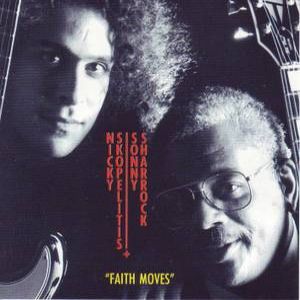SONNY SHARROCK/NICKY SKOPELITIS


1/ Who Are You (Sharrock,Skopelitis) 5.27
2/ Becoming (Sharrock,Skopelitis) 2.34
3/ Mescalito (Sharrock,Skopelitis) 3.28
4/ Venus (Pharoah Sanders) 5.48
5/ In the Flesh (Skopelitis) 3.05
6/ Sacrifice (Sharrock,Skopelitis) 4.43
7/ First of Equals (Sharrock,Skopelitis) 5.11
8/ The Pyre (Sharrock,Skopelitis) 6.06
9/ Uncle Herbie's Dance (Sharrock) 2.55
Recorded 1989/1990 at B.C. and Greenpoint Studios, New York
Engineered by Robert Musso, Martin Bisi, Oz Fritz, Bruce Calder and
Paul Berry
Mixed by Jason Corsaro at Platinum Island Recording Studios, NYC
Produced by Bill Laswell and Nicky Skopelitis
Mastered at Masterdisk by Howie Weinberg
Techinical Supervision: Ian Lintault
Sonny Sharrock: electric guitar; Nicky Skopelitis: electric and acoustic guitars,
baglama, saz, coral sitar, tar, bass.
1991 - CMP Records, CMP 52 (CD)
Note: Bill Laswell does not play on this album.
Scott Yanow (courtesy of the All Music Guide via the Get Music website)
If you think you've heard everything an electric guitar can do but the name Sonny Sharrock doesn't ring any bells, it's time for you to think again. Back in the days before jazz guitarists were cranking their amps up to 11 and before rock guitarists began acquiring jazz-based chops – before Hendrix, before Cream – the R&B-seasoned guitarist Sonny Sharrock was whipping up sonic thunderstorms in the company of Pharoah Sanders and other seminal free-jazz players.
One minute Sharrock would be quietly, rhythmically chording, like the doo-wop vocal-group guitarist he once was. Then, without warning, he'd burst into a paroxysm of six-string mayhem – thumb-picked bass runs rumbling like subways, seething distortion, glass-shattering tone clusters that sounded like someone was ripping the pickups out of the guitar with-out having bothered to unplug it from its overdriven amplifier. In the days when the Yardbirds' "Shapes of Things" seemed to be the cutting edge of electric-guitar music, Sharrock was a true visionary, in a class with nobody but himself.
Sharrock wasn't just "ahead of his time." Like a freight train roaring through a darkened station not just hours but weeks ahead of schedule, Sharrock was here and gone before anybody even knew he was coming. After a memorable series of albums with Pharoah Sanders and other jazzers and some powerful but quickly deleted solo albums on the French Byg label and Atlantic's short-lived Vortex subsidiary, Sharrock seemed to fade from view. Musicians talked about him, keeping his legend alive, but Sharrock himself was back home in upstate New York, playing local gigs and waiting for music to catch up with him.
During the early-Eighties New York No Wave fracas, punk and noise guitarists – ranging from certain Captain Beef-heart axemen to Richard Hell-Lou Reed sideman Robert Quine – began exploring some of the areas Sharrock had mapped out. With bands like the Voidoids, the Contortions and Sonic Youth breaking down boundaries, Sharrock's time drew nearer. When bassist Bill Laswell emerged from that same downtown scene as a producer and bandleader to be reckoned with, one of his first priorities was finding Sonny Sharrock. Laswell and Sharrock first collaborated on records by Material, Laswell's floating stock company of a band. In 1985 a Laswell-produced solo album, Guitar, announced that Sharrock was back and burning. Last Exit – a Laswell-organized electric free-noise band featuring Sharrock – recorded and toured Europe around the same time.
But these events were mere preludes to the one-two punch of Ask the Ages and Faith Moves, which display Sharrock's wild and wily wisdom in all its tumultuous glory. Of course, a player as stubbornly original as Sharrock would never have been content to remain static while the rest of the world caught up with him; his playing has evolved enormously. The bursts of wall-rattling shiver and clang have been augmented by an equally intense concentration on the purest, most liquid guitar tone and by a simple, stirring lyricism.
Faith Moves, Sharrock's collaboration with Laswell house guitarist and all-around stringed-instrument maven Nicky Skopelitis, is even better. The music is all made by Sharrock's Les Paul and Skopelitis's battery of guitars, basses and other Western and non-Western instruments, with up to ten overdubs per track. The versatile Skopelitis mostly provides multilayered settings for Sharrock's free-spirited leads. Some of the music leans east, some leans west. One tune, "In the Flesh," takes a gut-simple metal-guitar riff and wrests more sheer music from it than the likes of AC/DC ever dreamed of (I like AC/DC, but genius is genius). "Venus" is a deeply felt reworking of a Pharoah Sanders tune Sharrock got his first crack at on Sanders's 1967 album Tauhid.
(edited for relevance by Silent Watcher)
Robert Palmer (courtesy of the Rolling Stone website)